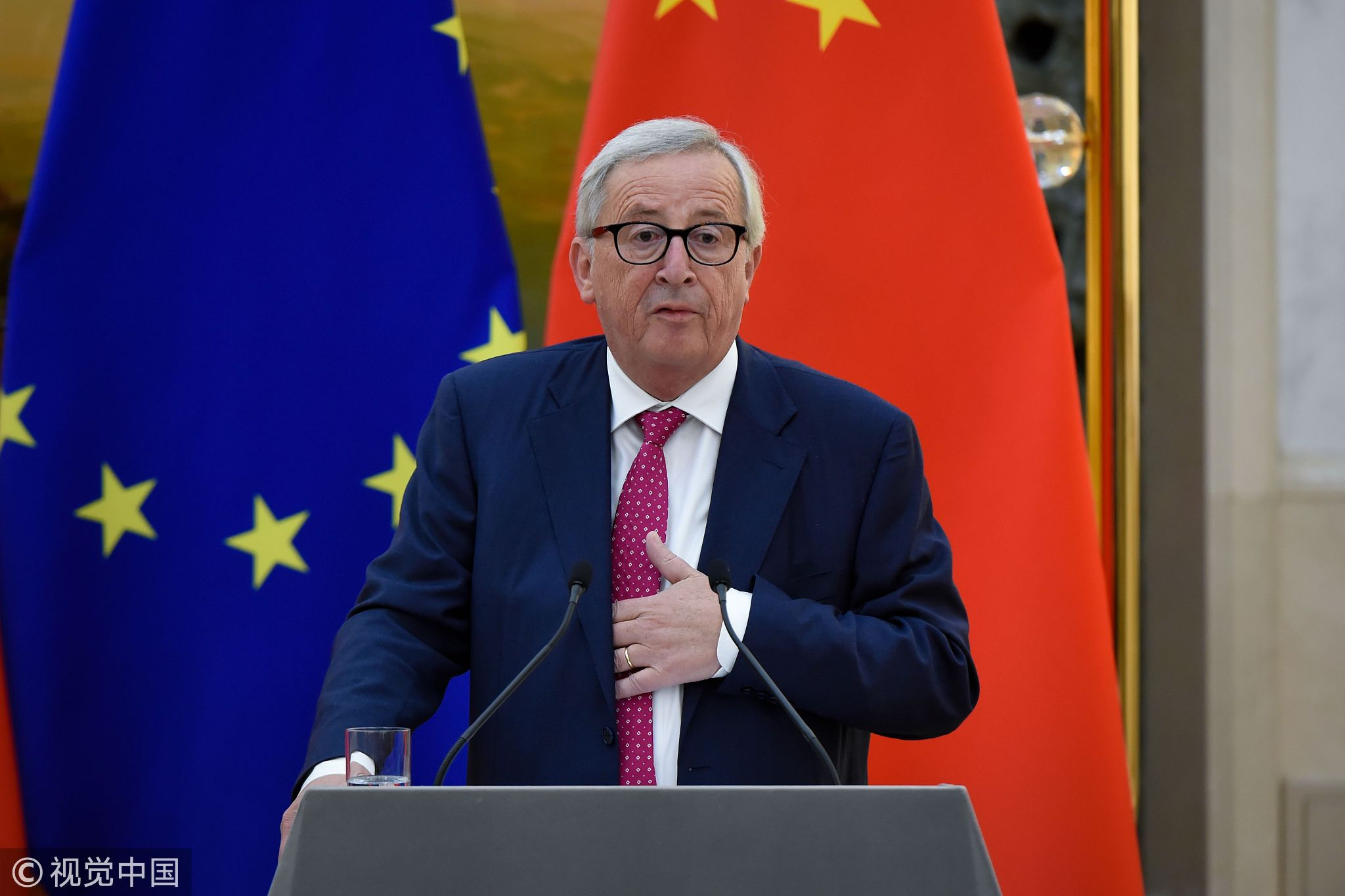
July 16, 2018: President of the European Commission Jean-Claude Juncker speaks during a press conference at the Great Hall of the People in Beijing. (Photo: VCG)
The 20th China-EU Leaders' Meeting came to an end with fruitful results.
Compared to the results of the past two meetings, at the crucial moment when both China and the EU are entering a new development period, when the international pattern and the world order are facing huge challenges of uncertainties and instabilities, the fruits of the meeting show that not only were bilateral relations achieved by stimulating a stronger endogenous dynamic, but China-EU cooperation is globally significant in leading the direction of change.
Breakthrough in China-EU relations
The leaders' meeting coincides with the 40th anniversary of China's reform and opening up and the 15th anniversary of the establishment of a comprehensive strategic partnership between China and the EU.
As early as the preparation stage of the meeting, the confidence of both sides in achieving positive results in the meeting continuously improved.
China is upholding free trade, opening the economy firmly, and implementing its commitments into policy practice efficiently. The positive signal from China dispelled the doubts of the European side.
Meanwhile, after interacting over the past two years, China and the EU are eager to enhance common interests and manage differences by focusing on priorities and seeking a comprehensive solution in a pragmatic way.
Furthermore, China and Europe have benefited from the open economy and multilateral system in light of dramatic changes in international affairs; however, both face enormous challenges.
In order to avoid the loss of common interests and to maintain the stability of the international structure and the benign operation of the world order, China and the EU must work together to meet the challenges.
In the two joint statements issued at the meeting, China and the EU promised to promote mutual trust, strengthen diplomatic and security cooperation, build an open economy with concrete measures of building the "One Belt and One Road" to jointly accelerate bilateral investment agreement negotiations, deepen cooperation in industrial and digital economic sectors, and cope with climate change and energy security issues.
The wide range of fields and lofty goals in the consensus are a rare outcome compared to other China-EU summits in recent years.
The internal motivation of the cooperation
The China-EU cooperation is driven internally motivated. First of all, China's commitment to deepening reforms and expanding openness is the biggest driving force for the two sides to strengthen consensus and enhance cooperation.
At the Boao Forum, President Xi made four major commitments: relax market access, create a more attractive investment environment, strengthen intellectual property protection and expand imports.
The newest "Special Management Measures for Foreign Investment Access (Negative List)" indicates that the above commitments have been further implemented as specific measures for opening up the service and manufacturing industries, and strengthening the adaptation with the international rule.
The European side captured China's positive policy signal and is eager to maintain its economic recovery through closer cooperation.
Although the European economy has continued to recover in recent years, it still requires a stable and favorable trade and investment environment, which will be provided by China's cooperation.
In the previous Sino-German government consultations, China set an example by relaxing investment restrictions in the automobile manufacturing industry, which enabled the EU to truly understand China's openness and sincerity of cooperation.
The global significance of China-EU's position
The outcome of the China-EU summit has enhanced the global significance of the cooperation. The two sides not only confirmed that they will strengthen "global partnerships," but also show a common position of opposition to the protectionist and unilateralist challenges that the current international community is generally concerned about.
The administration of US President Donald Trump has provoked a series of trade wars against its trade partners, including China and the EU, which not only disrupts market order but undermines the multilateral system, the international pattern and the world order.
Allegations that China was using the leaders' meeting to turn the EU against the US were a misunderstanding of the cooperation between the two sides.
China-EU cooperation does not target any third party, but when common interests are damaged, China and the EU are obligated to fight back.
This is not an issue of Europe picking sides between China and the United States, but a choice of the correct historical direction. History will prove that the great choices made by China and the EU will lead the transformation of the world in the right direction.


